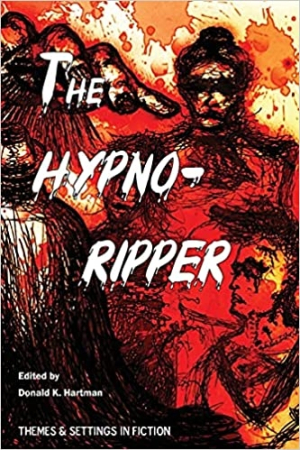The Hypno-Ripper
Or, Jack the Hypnotically Controlled Ripper; Containing Two Victorian Era Tales Dealing with Jack the Ripper and Hypnotism
The two stories in The Hypno-Ripper focus on the Jack the Ripper legend, suggesting macabre causes behind the crimes.
The brief literary collection The Hypno-Ripper combines two nineteenth-century stories that reconsider Jack the Ripper’s motivations.
Both of the novellas have intriguing hypotheses: they suggest that Jack the Ripper was either under hypnotic control, or was controlling others through hypnosis in order to commit his infamous crimes. Collection editor Donald K. Hartman teamed with crime fiction scholar Rebecca Frost for the book’s introduction, which leans into the stories’ suppositions. The introduction also contextualizes the stories, both historically and in relation to modern crime fiction, ably connecting contemporary crime stories to stories from Victorian times. Following the stories is a lengthy biography about the notable con man and writer N. T. Oliver, whose life story has been also exaggerated until he became, in memory, a larger-than-life figure.
In N. T. Oliver’s 1889 supernatural horror novella “The Whitechapel Mystery,” an American detective, John, investigates a bank robbery. His unlikely suspect is a doctor who’s capable of extreme hypnotic control of others. John chases the doctor to England, where he stumbles upon his macabre mission to murder innocent women.
Later, a doctor discovers John in an insane state moments before his death; a scrawled journal details how he came to this state. The journal is the story’s framing technique; John’s story is recounted through the doctor’s reading of the journal. Of the two stories in the collection, the first provides a compelling alternative theory through the trappings of a horror-laced crime story.
And from an anonymous writer working at the time of a notable Jack the Ripper murder, the existential dread-laced short story “The Whitechapel Horrors” follows Charles, an American businessman in London, who is in recovery after a breakdown. He becomes obsessed with the growing legend of Jack the Ripper. Each case gives him a sense of déjà vu, leading him to doubt his sanity. And Charles has information about the murders that he could only have if he was there. This entry, however, is short on narrative tension; its hypnosis element is underdeveloped.
Though the supplemental material devoted to N. T. Oliver and his falsified biography is interesting, it verges noticeably from the book’s core concepts, as raised in the introduction. Still, Oliver’s colorful life story, which included several shady endeavors, holds interest, even if most of its information either cannot be verified or was inflated to service the legend.
The two stories in The Hypno-Ripper focus on the Jack the Ripper legend; they are appended by the life story of a colorful con man who was fascinated with the killer.
Reviewed by
John M. Murray
Disclosure: This article is not an endorsement, but a review. The publisher of this book provided free copies of the book and paid a small fee to have their book reviewed by a professional reviewer. Foreword Reviews and Clarion Reviews make no guarantee that the publisher will receive a positive review. Foreword Magazine, Inc. is disclosing this in accordance with the Federal Trade Commission’s 16 CFR, Part 255.

